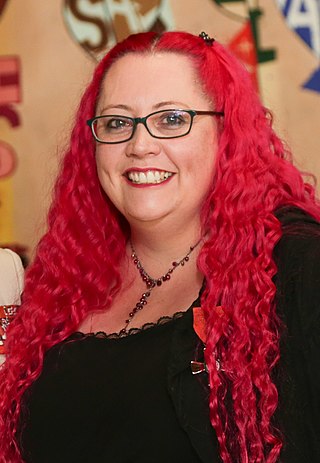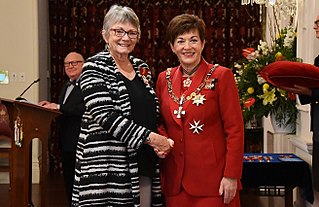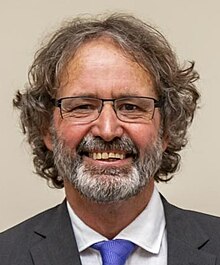Kahurangi Point is a headland on the West Coast of New Zealand's South Island, overlooking the Tasman Sea. It is located in Kahurangi National Park between Karamea and Farewell Spit.

The South Taranaki Bight is a large bay on the west coast of New Zealand, south of Taranaki, west of the Manawatu, north and west of the western entrance of Cook Strait and north of the South Island. The name is sometimes used for a much smaller bay in South Taranaki, between the mouth of the Kaupokonui Stream directly south of Mount Taranaki and the mouth of the Pātea River.

Edward René David Goldsmith, widely known as Teddy Goldsmith, was an Anglo-French environmentalist, writer and philosopher.
Simon Asher Levin is an American ecologist and the James S. McDonnell Distinguished University Professor in Ecology and Evolutionary Biology and the director of the Center for BioComplexity at Princeton University. He specializes in using mathematical modeling and empirical studies in the understanding of macroscopic patterns of ecosystems and biological diversities.

Water pollution in New Zealand is an increasing concern for those who use and care for waterways and for New Zealand regulatory bodies. An increase in population is linked to an increase in water pollution, due to a range of causes such as rural land use, industrial use and urban development. Fresh water quality is under pressure from agriculture, hydropower, urban development, pest invasions and climate change. While pollution from point sources has been reduced, diffuse pollution such as nutrients, pathogens and sediments development and from stormwater in towns is not under control. There are more than 800 water quality monitoring sites around New Zealand that are regularly sampled.
David William Schindler,, was an American/Canadian limnologist. He held the Killam Memorial Chair and was Professor of Ecology in the Department of Biological Sciences at the University of Alberta in Edmonton, Alberta. He was notable for "innovative large-scale experiments" on whole lakes at the Experimental Lakes Area (ELA) which proved that "phosphorus controls the eutrophication in temperate lakes leading to the banning of phosphates in detergents. He was also known for his research on acid rain. In 1989, Schindler moved from the ELA to continue his research at the University of Alberta in Edmonton, with studies into fresh water shortages and the effects of climate disruption on Canada's alpine and northern boreal ecosystems. Schindler's research had earned him numerous national and international awards, including the Gerhard Herzberg Gold Medal, the First Stockholm Water Prize (1991) the Volvo Environment Prize (1998), and the Tyler Prize for Environmental Achievement (2006).
Cameron Slater is a right-wing New Zealand-based blogger, best known for his role in Dirty Politics and publishing the Whale Oil Beef Hooked blog, which operated from 2005 until it closed in 2019. He edited the tabloid newspaper New Zealand Truth from November 2012 until it ceased publication in July 2013. Slater's father, John Slater, served as President of the New Zealand National Party from 1998 to 2001.

The New Zealand Tertiary Education Union is the main trade union in the New Zealand tertiary education sector, and represents the interests of more than 10,000 workers employed within the sector across New Zealand. Its membership includes academics, researchers, teachers and workers employed in all occupations in universities, polytechnics, institutes of technology, wānanga, other tertiary education providers and allied organisations.
Water quality in Taranaki is a notable environmental issue for many stakeholders with concerns about the potential impact from dairy farming in New Zealand and petrochemical industries.

Siouxsie Wiles is a British microbiologist and science communicator. Her specialist areas are infectious diseases and bioluminescence. She is based in New Zealand.
The International Ecology Institute (ECI) is a non-profit organization of research ecologists dedicated to promoting ecological knowledge and awareness. It was established in 1984, in the village of Oldendorf/Luhe, Germany by Inter-Research, a scientific publishing organisation founded in 1979 by Professor Otto Kinne.

Lesley Louise Rhodes is a New Zealand scientist. She is the co-leader of the Nationally Significant Database programme (NSD) for the Cawthron Institute. In the 2017 Queen's Birthday Honours, she was named as a Companion of the New Zealand Order of Merit in recognition for her contributions to science and marine farming.

Brian Peter John Molloy was a New Zealand plant ecologist, conservationist, and rugby union player.
Marti J. Anderson is an ecological statistician whose works is interdisciplinary, from marine biology and ecology to mathematical and applied statistics. Her core areas of research and expertise are: community ecology, biodiversity, multivariate analysis, resampling methods, experimental designs, and statistical models of species abundances. Based in Auckland, New Zealand, she is a Distinguished Professor in the New Zealand Institute for Advanced Study at Massey University and also the Director of the New Zealand research and software-development company, PRIMER-e.

Dianne Heather Brunton is a New Zealand ecologist, and head of the Institute of Natural and Computational Sciences at Massey University. Her research area is the behaviour and cultural evolution of animal communication, especially bird song in southern hemisphere species such as the New Zealand bellbird.

Janet Mary Grieve, also known as Janet Bradford-Grieve and Janet Bradford, is a New Zealand biological oceanographer, born in 1940. She is researcher emerita at the National Institute of Water and Atmospheric Research in Wellington. She has researched extensively on marine taxonomy and biological productivity. She was president of both the New Zealand Association of Scientists (1998–2000) and the World Association of Copepodologists (2008–11).

Susanna Wood is a New Zealand scientist whose research focuses on understanding, protecting and restoring New Zealand's freshwater environments. One of her particular areas of expertise is the ecology, toxin production, and impacts of toxic freshwater cyanobacteria in lakes and rivers. Wood is active in advocating for the incorporation of DNA-based tools such as metabarcoding, genomics and metagenomics for characterising and understanding aquatic ecosystems and investigating the climate and anthropogenic drivers of water quality change in New Zealand lakes. She has consulted for government departments and regional authorities and co-leads a nationwide programme Lakes380 that aims to obtain an overview of the health of New Zealand's lakes using paleoenvironmental reconstructions. Wood is a senior scientist at the Cawthron Institute. She has represented New Zealand in cycling.
Tara G McAllister is a New Zealand freshwater ecology academic and is associated with Te Pūnaha Matatini at the University of Auckland. She is a Māori of Te Aitanga ā Māhaki, Ngāti Porou, and European descent.

Ngoc-Lan Thi Pham is a New Zealand politician and ecologist. She was a regional councillor for Environment Canterbury for six years and was elected to Parliament as a Green in the 2023 New Zealand general election.











